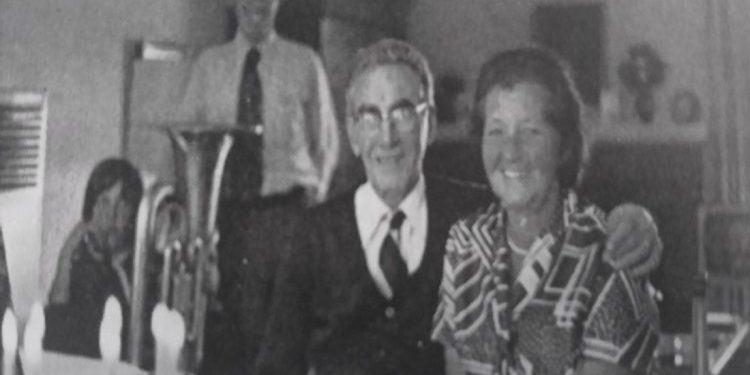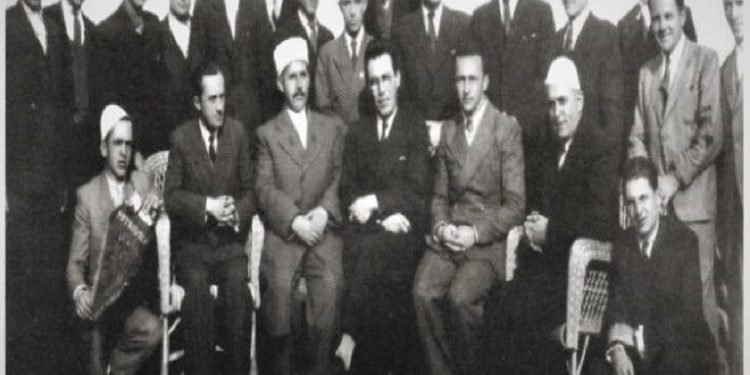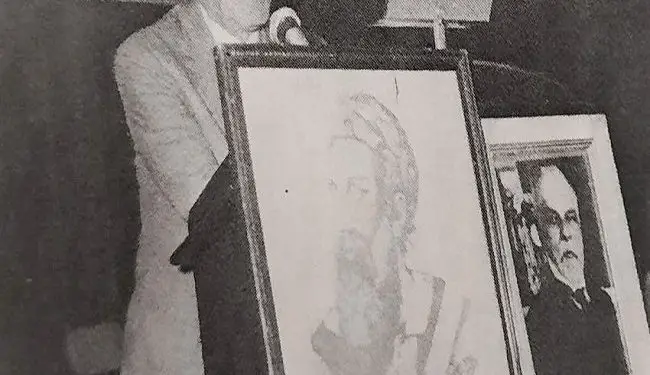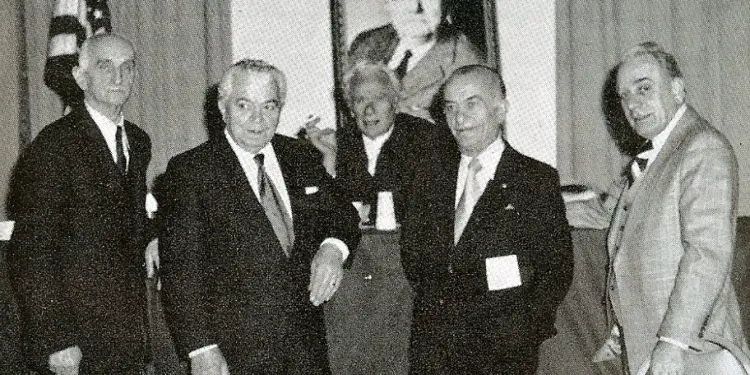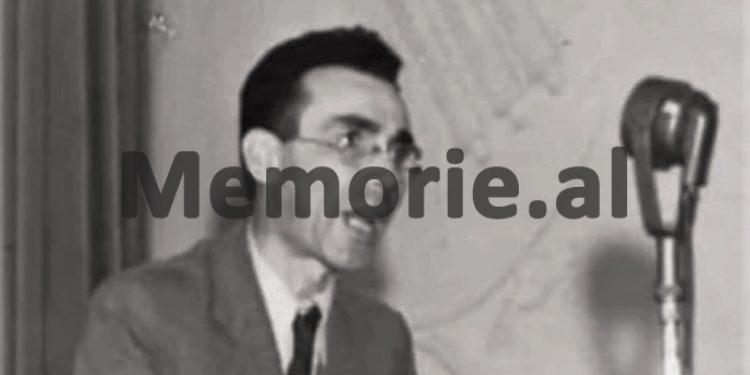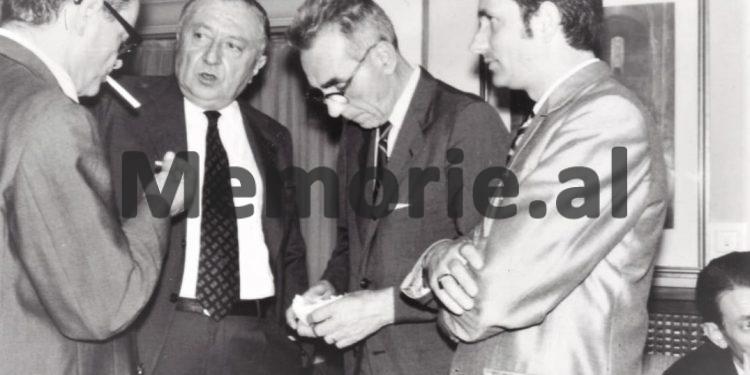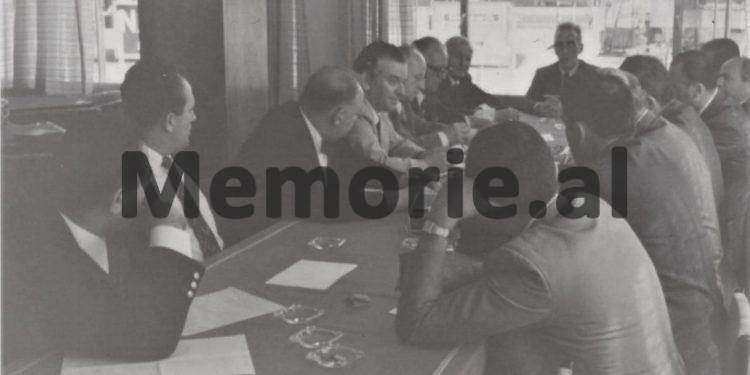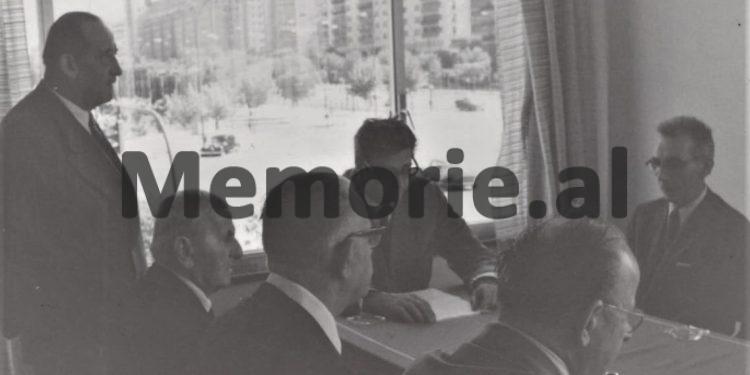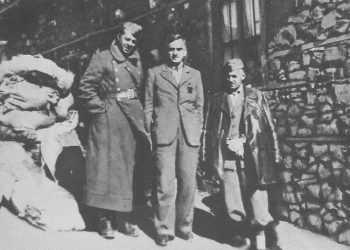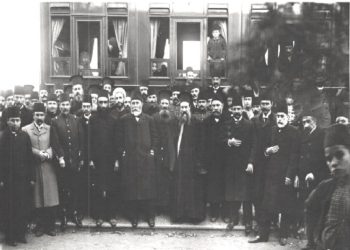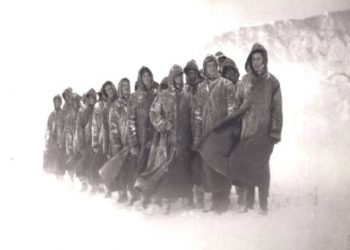By Idriz Lamaj
Part twenty-three
From the works of the apostles of ethnic Albania
Xhafer Deva
In light of his own letters and other diaspora revelations
Preface
Memorie.al/ Probably like many others, I often browse letters with my friends and associates, who are no longer in this life. Browsing through them, for a moment unfolds memories that it seems to me that some of them can serve our history. Then, I return to the awareness of the current difficult situation in the ethnic homeland, caused by the quadruple of Albanian politics, I say to myself: “What can my memories of others or the letters of the people of dead? ”
Without being the ominous instigator of pessimism, thinking as always of a better future, I return to my obligations to my friends, and as an icy observer of time, without any claim of historical service, when I am given the opportunity of publication, write what I have in mind, always based on their writings and letters. This principle is also followed in this book about Xhafer Deva. I knew Xhafer Deva in person; we exchanged visits and had a strong correspondence.
I spent days off at his house and inherited all of Xhafer Deva’s correspondence with Rexhep Krasniqi, his closest friend, for more than 40 years. After many years, I talked on the phone with Mrs. Deva’s daughter and son-in-law. In the conversation going on, taking advantage of the old friendship, I asked about his letters and they informed me that it was all Qefali Hamdia, a friend of their family.
In June of last year (2001) I went to Kenosha, Wisconsin, a guest of Qefali Hamdia, to look at Xhafer Deva’s correspondence, which Mrs. Deva sent her years ago, when she, due to her advanced age, was closed his house to go to the house of his 5th daughter and son-in-law, Mrs. Burgl Dagmar and Rev. Dennis Logie.
After reading the bulk of the letters, in the languages I knew, I took with me more than a thousand pages of his correspondence, covering a period of over 30 years, 1945 – 1978. Xhafer Deva spoke and wrote seven – eight languages. His correspondence is: Albanian, English, German, Italian, French, Turkish and Serbian. Xhafer Deva’s letters and writings, with the exception of those in Old Turkish and Serbian in Cyrillic, are mostly typewritten, well-kept, and alphabetically arranged, with the persons he dealt with.
That includes his family letters. He carefully kept a copy of every letter he sent and every letter he received. Mrs. Oswalda Deva, daughter Burgl, son-in-law Dennis Logie and Mr. Qefali Hamdia with family, expressed his heartfelt thanks for the trust they gave me. With special gratitude I recall here the help given to me by my brothers – Captain Nue Gjomarkaj and Nikoll Gjomarkaj, in the preparation of one of the most important chapters of this book.
Kapidan Nou, in addition to making available the subject on Xhafer Deva’s relations with the ‘Independent National Bloc’ and sending paratroopers to Albania and Kosovo, reviewed with me each document of that period, and we formulated the text in the form of a conversation; while Nicholas, deciphered the letters, transcribed and translated from Italian, the unpublished materials to date, which were published in this chapter.
Continues from the last number
Xhafer Deva’s life and activity in exile
– Kosovo in the time of Ethnic Albania –
Xhafer Deva in the light of his own letters
In the United States.
Xhafer Deva’s last message: – Keep alive the ‘League of Prizren’
Despite the great disappointment and the exhaustion of energies in the attempt to unite the Albanian political forces in exile as after the Madrid Agreement, Deva continues its activity in the service of the ‘League’. He, who from time to time complained to Mr. Rexhep Krasniqi, me, or others: “it is not held anymore, it must be stopped, we do not have intellectuals, we do not have financial opportunities, we do not work with intrigues”, has already changed from that Deva who did not make the slightest release, to those who wavering in their political stances. He makes plans for the future of the ‘League’ after his departure from this life; rehabilitates Vendreshen, softens the attitude towards Ismet Berisha, advises the closest friends to be generous towards them and to help them, in unexpected cases. This attitude of Deva sounds like a tangible testament: “Keep the League of Prizren alive!”
Three months before his death, he wrote in a joint letter: Dear Rexhep and Idriz, You can say that I am a fool. Can you ask what all these omissions are on my part? I have come to the conclusion that the ‘League’ must be kept alive after me, and after you, and after others, like me and you. When Shemsedini came to visit, I received him without anger, I told him that it does not matter if the ‘League’ can publish the newspaper or not. I told everyone on the phone and in letters, keep alive the ‘League of Prizren’. This is important. I advised them to consult with you about unexpected things. I told Shemseddin that some of their prey did not behave well with you, or with me. The arrival of Shemsedin and the phone calls with Ismet and Gjoni, etc., have made it much easier for me. If I improve my health, I will be able to withdraw slowly and quietly from the ‘League’. I promised them that he would always support them in their work for the ‘League’, and he continues with nostalgia: “You make men come to see me, I would not be sick, I would have come, I have not forgotten the order. ”I have no news from Raif. I am worried. Write to me or call me, after receiving information, how is your health.” Regards, Xhaferi (21, fruer, 1978).
Xhafer Deva, even in the last months of his life, was clear in judgment, friendly to friends, and uncompromising towards the ideals of the League of Prizren, the unification of Albanian lands in a democratic state. He died on May 25, 1978, on the occasion of the 100th Anniversary of the Historical League of Prizren. With his death, the League of Prizren lost its iron President. The Albanians lost the classic rifle and pen fight, the man who left no stone unturned against the Serbian occupiers, the man who hated to death any kind of cooperation with the Serbs, at the expense of ethnic Albania.
Xhafer Deva’s remains are buried today in a solitary grave in the green Palo Alto’s Cemetery in California. His remains must be returned to Kosovo and reburied in his hometown, in the famous Mitrovica of Isa Boletin, in that city, which today is threatened with death by Serbs. His grave in his hometown would be a border pyramid, which would guard the homeland more than a soldier stuck in arms. It is his name and activity that frightens our age-old enemy. It is the name, Xhafer Deva, about whom a Serbian prime minister said: “Deva is not bought before, because he is rich, Deva is our conspiratorial enemy, Deva must be killed.” It is the moral duty of Kosovars, today in a free Kosovo from the Serbian occupiers, to return Xhafer Deva to Kosovo.
WRITINGS OF XHAFER DEVË
‘SUCCESSFUL DESTRUCTION FUND OF THE SOVIET UNION IN THE MIDDLE EAST’
It has never happened before that the United States Naval Forces stationed in the Mediterranean received orders to demonstrate force and prevent any kind of aggression in this region, in other words this was a step that went beyond the protests common in words, whenever the interests of a Great Power in remote regions were called into question. The Soviet government responded to this crucial step by launching several warships in the direction of the Mediterranean, on the pretext that they would visit Russia’s only small ally in the Adriatic, Albania, and my hometown. Such a step deserves the most attention, even in terms of the possible consequences, i.e., World War III. Both Moscow and Washington are aware of the importance of the Middle East in the event of such a horrific armed conflict between East and West.
But because of the oil wells and pipelines that run through various Middle Eastern countries and because of a possible siege by US ally Turkey, such a move is certainly not simply a matter of prestige and complications in this region can easily become very dangerous. How did it become possible for the Soviets to settle in the Middle East? Since the time of Peter the Great, Catherine and the Romanovs, the aim of the Russian imperial regimes has been to provide access to warm waters, both in the North and in the South, i.e., to become masters of the Atlantic and the Mediterranean. They almost achieved their southern goal in 1877, when the head of the Russian Imperial Army arrived at the gates of Constantinople (modern-day Istanbul), where it was stopped by the diplomatic maneuvers of the great powers of the time.
Weakened Russia could not undertake an armed conflict with the Great Powers of Europe, who were interested in the straits and held by the powerless Ottomans in particular Great Britain. Consequently Russia was forced to accept the decisions of the Great Powers convened at the Berlin Conference in 1878. Russia had to settle for some land concessions in southeastern Russia, while the Romanians, Bulgarians, Serbs and Greeks, for the protection of which Russia had ostensibly declared war on the Ottoman Empire, giving it full independence. Russia gained the right of passage through the waters under the sovereignty of the Ottoman Empire (Dardanelles), under the Convention ratified by all the powers concerned 204 for these waters. However the Russian plan to become lord of the straits ended in complete failure. Nothing has changed from Russia’s political intentions since then.
But after securing an exit to the Atlantic Ocean, bringing the Baltic States under control, the Soviet Union, as the victor of World War II, was not content with this great victory. Now this country aspired to dominate the Mediterranean. And to achieve this, he would be very close to his main goal, the World Revolution. Russian penetration into the Middle East is just one link in the chain of world domination, which is the communist doctrine preached by Lenin, Stalin and others. As fantastic as such ambition may seem to us, let us not deny it, as we often do, for what has happened. We can bring a lot of evidence to show that we often underestimate Russian successes. Whenever we face the purge processes in Soviet Russia, we tend to think that the communist regime will collapse, or at least that internal discontent will force Russian politics to enter the path of peaceful coexistence with the so-called world our capitalist.
And every time the events that followed, showed that we were wrong in our optimism full of hope, out of our confidence and desire to live in peace. We must not forget that by being merely anti-communist, we do not constitute a powerful obstacle that could stand in the way of Russia’s dangerous penetration. It is not enough to be aware of the destructive impact of communism on society, culture, religion, civilization, which culminates in the complete annihilation of individual freedom and of everything that is essential to us. We must also be aware of all the tools and tactics that make it possible for our enemy to penetrate. We must be clear that it is pointless to fall into the trap of provocations, at the time, place and the way the Russians want to push us to take police action. Otherwise we would beat water in the mortar. Muscovite craftsmen know very well how to seize the opportunity and choose the time and place to begin their destructive actions.
The most suitable terrain for them are the places with the lowest standard of living, in which misery reigns. There they can act easily and without hindering anyone, because of the gap that separates the ruling class from the masses of the people. They exploit hunger. They have very well-trained agents recruited from the ranks of half-hearted but idealistic intellectuals, who hate the ruling classes and who are conspirators by nature. These agents are instructed to set up cells among young people and limit their propaganda to efforts to magnify existing misery. The agitation focuses on the luxurious life led by the ruling classes and on the fact that the misery of the people is caused by the abuses of the ruling class.
The propaganda material, which has been prepared in Moscow by special experts for the respective countries and in the respective languages, is carefully processed and accompanied by illustrations from life in Russia, where the reactionary classes have completely disappeared. Special attention is paid to primary schools, where the communists have their trained agents as teachers. These teachers choose among their students those elements that can serve the communists. They build cells that act quietly. In the first stage, religion is not directly attacked, but there is a lot of talk about free love and the obstacles that religion raises in relation to marriage, etc. Since in hot countries boys usually reach sexual maturity between the ages of 10 and 12, while girls from 8 to 10, the topic of free love is one of the most appealing and a start towards atheism.
The lack of a family culture in the East, in the American and European sense of the word, leaves all doors open for the penetration of such destructive propaganda directly into the lives of boys and girls. After becoming a member of a cell, the girl or boy begins to enjoy life and tries to try or put into practice things that his or her religion forbids. Here they clash with religion and begin to hate it. Cell leaders care about their further education in the literal communist sense of the word and consciously or not, they all become blind tools of this ideology. Cell leaders then begin to engage each cell member on an individual mission.
The first lessons are devoted to eavesdropping at school, at home and elsewhere. After turning into spies for their schoolmates, parents and friends, they have been so compromised that they have no way out of the cell. This systematic push against crime is one of the most effective tools the communists use to turn some of the best and most honest people into blind followers. Then they have the young men and women completely in their hands. Gradually, from primary schools, their activity shifts to secondary schools and universities, and what is worse, to military academies. Young spies coming out of primary schools have now taken the path to shape social life in their country.
Cells in higher institutions are quite different from those in the beginning. Child spies have now become intellectuals familiar with the language and theory of Marxism. Moreover, while all students need to think about their future and the best start would be a government job, cell leaders make the most of the connections they have with senior government officials to find them high-paying jobs and a promising career. The price they have to pay for such a career is always the same: to remain a good and reliable tool of the masters in Moscow. In some cases the language they now hear from cell heads is quite different. And whoever shakes will hear a note of horror.
Since we are talking about the methods of terror used by cell leaders against shaky members, it would be of great interest to mention here the practice of such terror in countries that are not under communist rule. All cell members know full well that they are eavesdropping on them and that there is nothing that the cell leader does not know about them, even in terms of their most intimate feelings. Therefore, it is the duty of each member to report to the cell leader and to tell him / her about the suspicions he / she may have had in any case, etc. In communist language such a story is called self-criticism. The cell leader then held a meeting with all the cell members, where the shaking person repeated his confession. Usually the cell leader cites similar examples from the communist secret literature to encourage the discouraged member.
These examples are elaborated by high-ranking communist experts, usually in countries under the communist regime, but the examples belong to the period when communism in these countries was illegal. Then the discussions begin and each member expresses his opinion. Sometimes such discussions take very rude forms and the entire shaking member’s gossip comes to the fore. Putting himself in the role of referee, the cell leader then gives another chance to the accused cell member, because of his self-criticism, highlighting his excellent character and the tasks he has performed in the past. He then promises that no record will be made of his behavior, and so on. Then the discussion continues. Memorie.al
Continues the next issue





